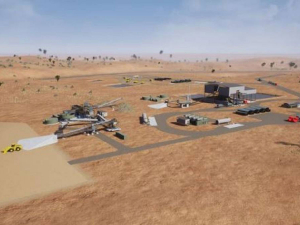Ravensdown partners with Footrot Flats to celebrate Kiwi farming heritage
Ravensdown has announced a collaboration with Kiwi icon, Footrot Flats in an effort to bring humour, heart, and connection to the forefront of the farming sector.
 Ravensdown is importing 5,000 tonnes of phosphate rock from the newly commissioned Ardmore Mine in Queensland, Australia.
Ravensdown is importing 5,000 tonnes of phosphate rock from the newly commissioned Ardmore Mine in Queensland, Australia.
Fertiliser co-operative Ravensdown is trialling a new source of phosphate rock from Australia.
It is importing 5,000 tonnes of phosphate rock from the newly commissioned Ardmore Mine in Queensland, Australia.
Mike Whitty, Ravensdown general manager supply chain, says that it’s early days, but Ardmore Phosphate Rock has the potential to form a part of Ravensdown’s nutrient offering, helping to firm up local supply of high-quality Superphosphate for New Zealand farmers and growers.
“If the last few years have proven anything, it’s the value of having more options.
“We’re operating in an ongoing environment of instability when it comes to managing supply chain risks and increasing costs. It’s a culmination of familiar factors, including the conflict in Ukraine, political tensions in other parts of the world, and we’re seeing that COVID-19 has a very long tail.
“The lasting effects of the pandemic reach beyond simple shipping delays, we’re also seeing less commodity exports as countries like China intensify their focus on internal food security.
“As a Co-operative, it’s our job to identify and manage those risks on behalf of our farmer and grower shareholders. We’re committed to ensuring they have ongoing access to the essential nutrients needed to run their businesses.”
The trial shipment will undergo rigorous quality tests here in New Zealand.
The export operation at Ardmore Phosphate Rock Mine is owned by a 100% subsidiary of Centrex Ltd, Agriflex Pty Ltd.
Centrex chief executive Robert Mencel, says it is delighted to be working with Ravensdown to introduce our product to the New Zealand market.
“We have the utmost confidence in the quality of our phosphate rock and its ability to significantly reduce supply risk for our trans-Tasman allies.”
Ravensdown will continue to investigate and trial other sources of phosphate rock closer to New Zealand as part of our ongoing effort to manage quality, surety and cost risks for New Zealand farmers and growers.
About the trial shipment
- Ardmore Mine in Queensland Australia is a new source of high-grade phosphate rock.
- The phosphate rock will be tested and processed at Ravensdown’s Christchurch and Dunedin manufacturing sites.
- Superphosphate contains plant-available phosphorus, sulphur and calcium, which are all essential nutrients for life. It’s an ideal option, along with agricultural lime for managing the health and productivity of New Zealand’s pasture-based farming systems.
The Meat Industry Association of New Zealand (MIA) today announced that Chief Executive Officer Sirma Karapeeva has resigned from the role.
The winners of the 2026 Hawke’s Bay/Wairarapa Dairy Industry Awards were announced at the annual awards dinner held at Copthorne Solway Park in Masterton on Thursday evening.
Environment Southland is welcoming this week’s decision by the Environmental Protection Authority (EPA) to approve the release of Blaptea elguetai, a leaf‑feeding beetle that will help control the highly invasive Chilean flame creeper.
This March, the potato industry is proudly celebrating International Women’s Day on 8 March alongside the International Year of the Woman Farmer, recognising the vital role women play across every part of the sector — from paddocks and packhouses to research, leadership, and innovation.
Fruit trader Seeka posted a record profit and returns to shareholders in 2025.
Recent weather events in the Bay of Plenty, Gisborne/Tairawhiti, and Canterbury have been declared a medium-scale adverse event.
OPINION: Staying with politics, with less than nine months to go before the general elections, there’s confusion in the Labour…
OPINION: Winston Peters' tirade against the free trade deal stitched with India may not be all political posturing by the…